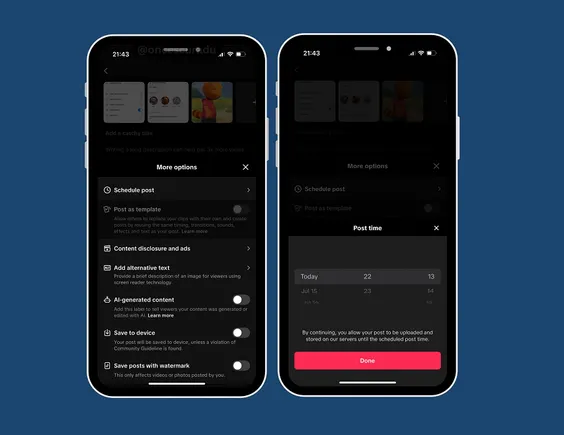SunnyD Vodka Seltzer draws fascination, scorn—behind the rise and risks of crossover drinks
SunnyD Vodka Seltzer joins other products that blur category lines, including Mtn Dew Hard Seltzer, raising the possibility of regulator scrutiny.

When Mtn Dew put out a hard seltzer version of the teenager-friendly soda early last year, it signaled that big beverage companies were ready to test the boundaries that for decades had kept brands from venturing into the potentially risky territory of so-called crossover drinks.
While the backlash has been somewhat muted for that drink and similar collaborations —such as Simply Spiked Lemonade from Coca-Cola and Molson Coors—a new product has the potential to put the industry in the crosshairs of regulators: SunnyD Vodka Seltzer.
The drink, which will hit select Walmart stores beginning this weekend, is an alcoholic version of the 60-year-old orange drink brand long associated with kids. The vodka seltzer, officially announced this week, comes in a 4-pack of 12-ounce slim cans and contains 4.5% alcohol by volume, which is slightly above the ABV of the average light beer.
Ilene Bergenfeld, chief marketing officer of SunnyD owner Harvest Hill Beverage Company, described the rationale in a press release: “Consumers are passionate about this iconic brand, rooted in nostalgia but with a taste that resonates today. Many have told us that they enjoy SunnyD as a mixer and asked for this product. So, we looked at the hard seltzer category, and thought, good, but we can do better. And SunnyD Vodka Seltzer was born."
But Trevor Stirling, a financial analyst covering the alcohol industry for Sanford C. Bernstein, immediately pounced on it as an “egregious example” of “irresponsible marketing of U.S. beer and near beer.”
Stirling made the comment in a note sent to investors today in which he re-shared a lengthy Bernstein report issued late last year that cited several new alcohol-juice-soda brand crossover products while warning that the drinks industry risked “a public furor over irresponsible marketing glorifying alcohol brands amongst the underaged.” The report referred to the trend as a possible “Joe Camel blow-up,” citing cigarette branding from years ago that was accused of appealing to children.
A SunnyD representative did not provide a comment when asked about the criticism.
Health concerns and industry wrangling
The Bernstein report, which Stirling co-wrote with Nadine Sarwat, cites examples including Mtn Dew Hard—which is made by Boston Beer Co. but sold through a PepsiCo distribution system called Blue Cloud.
The report includes a photo of Mtn Dew Hard sharing store space with a Hot Wheels display in an unnamed location. The photo is attributed to the National Beer Wholesalers Association, which represents beer distributors. Beer distributors view PepsiCo’s Blue Cloud unit as competition. That dynamic was cited in a report late last year by beer blog goodbeerhunting.com, which suggested that photos of such displays are being “weaponized” by beer distributors, but “any details about how these displays came to be are virtually nonexistent.”
A Mtn Dew representative did not provide comment when asked about concerns raised in the Bernstein report.
Mtn Dew Hard is now sold in 11 states but its footprint is expected to grow to about 30 states by the end of the year. The brand’s newest orange-flavored variety, called Livewire, debuted on March 1. The ad campaign is called “Definitely over 21” and plugs a contest in which consumers can win a three-day stay at a retirement community in Florida and partake in a brand launch party, described in promotional materials as a “mature spring break weekend.” While lighthearted, the campaign is “perhaps a not-so-subtle move to reinforce the brand’s positioning as an alcoholic beverage for those over the legal drinking age,” reported Beverage Digest. Golin is the agency behind the campaign.
The Bernstein report also mentions several recent Coca-Cola collaborations with beer marketers, including Simply Spiked and Fresa Mixed, made in partnership with Corona distributor Constellation brands. Coke has also announced a venture with Jack Daniel’s maker Brown-Forman for premixed cans of Jack & Coke.
The innovations come as drink marketers try to appeal to younger drinkers who desire more variety and are in some cases shunning traditional beverages such as beer.
More news: See Modelo's new ads
So far, products that blur the lines have not raised significant consumer backlash, although the trend is getting more scrutiny. The New York Times in late February published an article titled “Big Soda’s Alcohol Drinks Worry Health Experts” that suggested “the convenience of the new products could reverse the long-term decline in alcohol consumption by young people.”
Christopher Shepard, a senior editor at beer trade publication Beer Marketer’s Insights who reports on alcohol policy, told Ad Age that while “a handful of commentators have raised concerns about this … we haven't seen consumer groups or parent groups raise real concerns about some of this branding, suggesting to me maybe culturally we’ve evolved to a place where it is less of a concern.”
But SunnyD is likely to raise more eyebrows because of the nature of the product, Stirling suggested in an email interview Tuesday. “My perception of SunnyD (or Delight as it used to be) is that it is a brand that appeals to younger consumers (whereas say Coke has a much broader appeal across the generations.) So to see Sunny D and vodka on the same packaging is at least jarring,” he wrote.
Shepard said that “any time you're using a brand that's primarily marketed to underage consumers, and you're adding alcohol to it, it raises the risk.”
Some lawmakers have already taken notice of the blurring lines. State legislators in Virginia have passed a bill that would ban retailers from placing alcoholic beverages and non-alcoholic beverages that have the same or similar name and branding “immediately adjacent” to each otter. The legislation, which Gov. Glenn Youngkin has not yet signed, also requires stores to clearly notify consumers that the boozy versions of the products contain alcohol.
Duane Stanford, editor and publisher at Beverage Digest, said SunnyD Vodka Seltzer “adds fuel to the fire of the tension around this issue.” But he added that “as long as you're operating within the law, and merchandising responsibly in marketing, and marketing the product correctly, there's a way you can (be successful). At the end of the day, consumers are going to decide.”
So far, SunnyD Vodka Seltzer has mostly attracted lighthearted comments on social media. Below, a sample.

 ValVades
ValVades 































